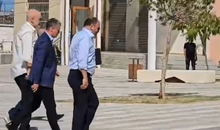
 Flash News
Flash News

by Altin Gjeta
In less than 4 months, Albania will go to the polls for the tenth time since the fall of the Stalinist Hoxhaist regime. After three decades of opening, it is assumed that Albanians will head to the polls to choose between programs and political ideas on how to address the country's problems. But, ironically, Albania has not only not been politically emancipated towards a functioning and consolidated democracy where democratic rules, as scholars Stepan and Linz say, are the only rules of the game in the 'city' (country), but over the last decade under of Edi Rama, it has slipped rapidly towards a Chavista autocracy.
Of course, Albania has found it difficult to get out of the pre-democratic and pre-capitalist situation left by the communist regime. However, after the 1990s, the country managed to take some steps towards openness and integration within the Euro-Atlantic framework and undertook some bold liberalization reforms in 2005-2009. The pluralistic system, although anemic, guaranteed the existence of some kind of competitive hybrid regime. In other words, this means that despite the ongoing problems with elections, control and balance of power, independent institutions, and political parties, the system allowed political parties and citizens to punish failures during their second term.
But after the aggressive erosion politically engineered by the socialist majority of constitutional institutions and the entire democratic order in the country, Albania for the first time is in danger of slipping away from competitive authoritarianism, where there was room for maneuver for the opposition, civil society, and media to stop. the overthrow of the country towards hegemony. This is because the April 25 elections, in terms of the context in which the country is located, risk being unlike any other political election party.
For the first time in post-communist history, the majority controls all power in the country capillary by the Council of Ministers, the dysfunctional Parliament, the local government, most of the media, and any other public and private agency if you will. This makes the government an electoral manipulation machine in the face of all other powerless segments of society. As if that were not enough, Rama, like no one else before, has moved all the stones on the field, changing the constitution and the electoral code unilaterally to ensure electoral advantage at the table.
Second, the April 25 election will be unquestionably marked by the COVID-19 epidemic. The government will try to exploit the health crisis by sowing fear to restrict the freedoms and rights of the individual, as it has done throughout this period. This would prevent citizens from actively participating in politics through open electoral meetings. Rama wants to keep as many dissatisfied citizens at home as possible during the election campaign and on Sunday, April 25, as he knows that a massive turnout would be disastrous for his party. Therefore, under the pretext of the health crisis, the government will try to keep the opposition away from the citizens and electoral rallies so important for weaving its winning halo.
Finally, unlike previous elections, this time it will be difficult for opposition actors to make politics, in the sense of offering realistic alternative ideas on the existential challenges the country is going through, not just Rama's populist style and an empty narrative. makes this venture difficult, but also because the socio-economic structure of Albanian society has degraded. As a result of the pro-oligarchic policies pursued by Rama and the massive corruption in all branches of government, according to international reports (UN and OECD recently), Albania will go to these elections poorer and more empty than ever by young people and free people.
The economic model that Rama has built is an etatist model based on the distribution of revenues collected from high direct and indirect taxation to government clients. In this way, this model has emptied the pockets of Albanians because it does not produce economic growth for citizens, but through labor, policies have become a control mechanism over their lives. Thus, this has led most businesses and individuals to link economic survival with the state budget, ie the government, which in a way has turned them into slaves of power. A poor society, runaway and with its neck in the grip of power has no ear and no interest in listening to political ideas and alternative governing programs.
Thus, in this context, the April 25 election race will be the most unequal in the 30-year history of post-communist Albania. Unfortunately, the circumstances dictate that at stake will not be the vision for a left or right Albania, for the application of a flat or progressive tax, but on the scales will be the choice between freedom and anti-freedom. Of course, Rama's speakers and noisemakers will tell us that in Albania people can speak freely, that there is a constitutional and democratic order, and that in the last instance Rama is not an autocrat, but an artist with taste and refinement. According to Hayek freedoms (in the plural) come into play when, in fact, true freedom is lacking. It may happen that a group of privileged individuals (government courtiers) are free, but much of society is oppressed, Hayek says.
In these conditions, it is required that all segments of Albanian society and opposition actors unite in a single front to bring the dissatisfied to the polls in order to overcome the expected manipulation of the free will of the majority to overthrow Rama and regain freedom. . From here, a new political cycle can be opened which should aim at expanding freedom, as according to Amartya Sen, Nobel laureate in economics, freedom is the foundation of a society's development.
Latest news

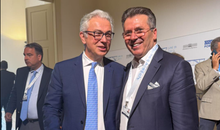

What does Zelenskyy have more than Zegjineja?
2025-07-05 18:45:26

Fiscal peace, but at a cost
2025-07-05 18:00:10
'Bankers' tax evasion, Chinese CEO and former director jailed
2025-07-05 17:39:21
Kyle Walker joins English club on two-year deal
2025-07-05 17:20:24
Two cars collide on the Saranda-Delvina axis, 4 injured
2025-07-05 17:05:29
Touching gesture! Liverpool will pay Jota's family's salary until 2027
2025-07-05 16:45:18
The zodiac signs that cheat most often
2025-07-05 16:25:53

"I asked for the dismissals", Dredha tries to soften Rama's 'blow' in Vlora
2025-07-05 15:48:49
Bomb threat in Parliament, prosecutor: It was a lie
2025-07-05 15:22:28

Bardhi: The recount revealed how greedy Zeqine Balluku is in stealing
2025-07-05 14:44:29
Knife wound on the secondary road Tirana-Durrës, perpetrator sought
2025-07-05 14:37:54
Tears and pain, Diogo Jota is escorted to his final home
2025-07-05 14:21:34
Success starts with yourself! Simple ways to invest in personal development
2025-07-05 13:58:50
Unlicensed firearms found in apartment, 50-year-old arrested in Lushnje
2025-07-05 13:43:11

Tirana Court remands Skerdi Sina to prison
2025-07-05 12:59:34
Cocaine laboratory in Greece, here are the Albanians arrested and wanted
2025-07-05 12:40:16
Directed Justice/Vangjeli: SPAK does not investigate any scandal involving Rama
2025-07-05 12:22:03

Bomb alert, Police remove MPs and media from Kosovo Parliament building
2025-07-05 11:48:16
"The will of the people" and the irony of ordered resignations
2025-07-05 11:32:05
Summer drowning risk: How to enjoy the water without risking your life
2025-07-05 11:20:27
Fire situation in the country, 16 fires reported in 24 hours, 4 still active
2025-07-05 11:07:04
Car hits pedestrian at white lines, injured in serious condition in Vlora
2025-07-05 10:59:58
Mosquito-borne diseases are a growing problem in Europe
2025-07-05 10:44:13



One of Sweden's most dangerous and wanted criminals arrested in Turkey
2025-07-05 09:38:29
Foreign exchange/ How much foreign currencies are bought and sold today
2025-07-05 09:18:38

"Don't be influenced by the opinions of others", today's horoscope
2025-07-05 08:40:50

Morning Post/ In 2 lines: What mattered yesterday in Albania
2025-07-05 08:02:07

Trump says he's ready to raise tariffs to 70% on some countries
2025-07-04 22:35:52
Tre shenjat e zodiakut që do ‘pasurohen’ në Korrik
2025-07-04 22:05:09
Gaza War: Hamas Accepts US Proposal for 60-Day Ceasefire
2025-07-04 21:50:10
Autocracy in Albania, Fuga: Governance has gotten out of control
2025-07-04 21:40:51
Meta: Agriculture on credit, the new fraud!
2025-07-04 21:26:39




Vote recount in Durrës ends without changes
2025-07-04 20:12:54
Gas station explodes in Rome, 25 injured (VIDEO)
2025-07-04 20:00:20

These afternoon habits often sabotage weight loss
2025-07-04 19:39:28
Former Arsenal player Thomas Partey accused of rape
2025-07-04 19:24:21
Shepherd disappears without a trace in Delvina
2025-07-04 19:14:31

Bardho gave Zegjine's mandate/Braho: Unfair! It violates the electoral system
2025-07-04 19:01:08


Rapid developments in the Sultanates!
2025-07-04 18:00:06



Italy tightens rules for skateboard traffic
2025-07-04 17:20:18

Unusual for the time, dense fog covers the coast of Vlora
2025-07-04 16:48:01


Accident on the Shkodra-Lezhë axis, one dead and 3 injured
2025-07-04 16:14:19
Albania with fewer requests for asylum and Albanian citizenship in 2024
2025-07-04 16:06:57

Albania last for quality of life, DP: Technical government is the solution!
2025-07-04 15:42:30
Nico Williams says "No" to Barcelona, signs with Athletic Club until 2035
2025-07-04 15:33:35
Fires in the country, four fires are still active, what is the situation?
2025-07-04 15:24:20

Summer brings big changes for these 4 zodiac signs
2025-07-04 15:00:04
Osmani: MPs need to agree to a secret ballot for the Speaker of Parliament
2025-07-04 14:51:09
Serious accident on the Peqin-Elbasan axis, two injured
2025-07-04 14:37:56

GJKKO leaves in force the security measure for the head of the KPP
2025-07-04 13:58:17
Who will replace Ilir Meta and take over the leadership of the PL?
2025-07-04 13:50:36
Berisha: Dismissal of directors in Vlora, another act of 'scapegoats'
2025-07-04 13:41:46




Librazhd/ In a serious psychological state, the young man consumes pesticides
2025-07-04 13:05:07


Weapons trafficked from Kosovo to Albania, two arrested, 8 pistols seized
2025-07-04 12:33:28
Konsumimi i tepërt i çokollatës, ja cilat janë dëmet që shkakton në organizëm
2025-07-04 12:23:35

Fires in the country, 21 fires in the last 24 hours, 4 still active
2025-07-04 12:00:19
WB calls for debt transparency: Albania to publish details of every loan
2025-07-04 11:50:05
Changes in the State Police, new names expected to lead 5 police stations
2025-07-04 11:40:06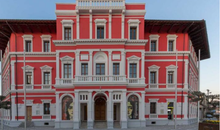
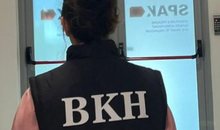
The race for the head of the BKH, the third phase on July 11
2025-07-04 11:20:23
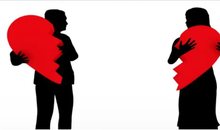
Toxic phrases that show your relationship is in trouble
2025-07-04 11:00:10